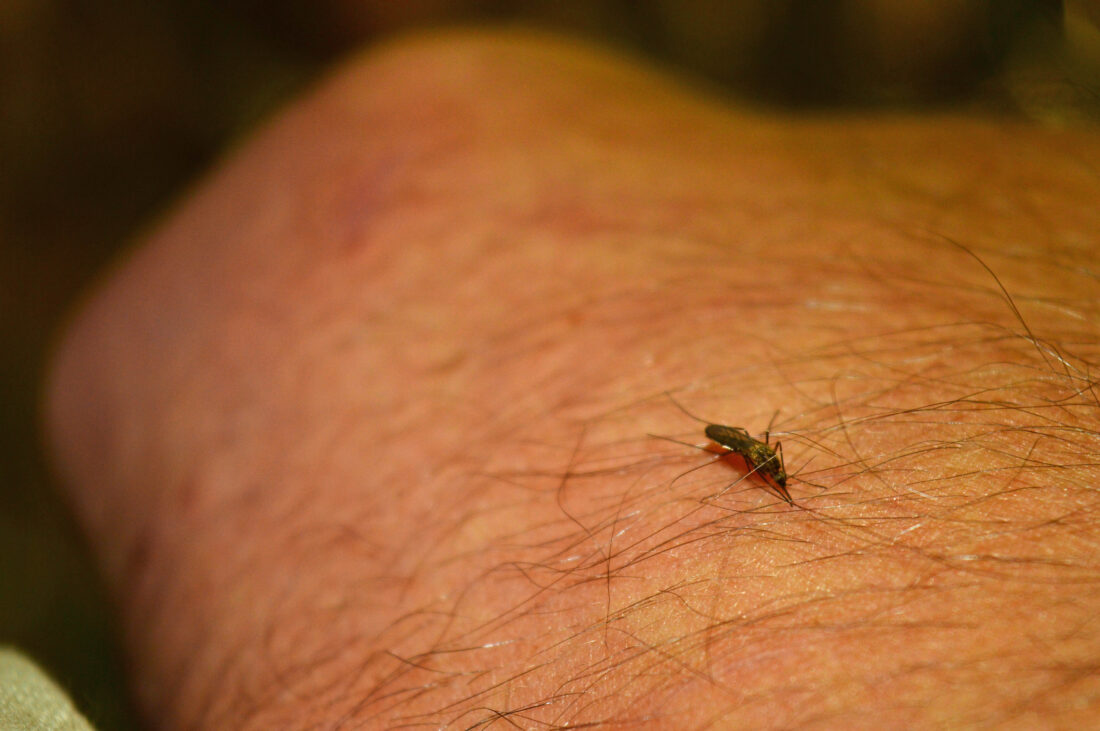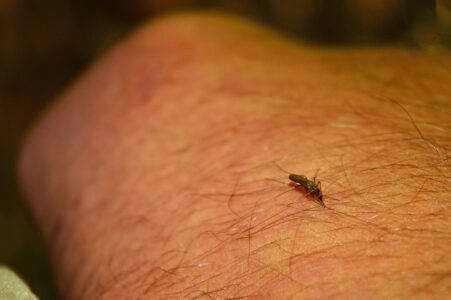Franklin County resident contracts West Nile virus
First case in county in 20 years, officials say to prevent mosquito bites

A Franklin County resident has been diagnosed with West Nile virus, the first case in the county since the early 2000s. The virus is mostly spread to humans through mosquito bites. (Enterprise photo — Aaron Marbone)
A Franklin County resident has tested positive for West Nile virus and public health officials are telling the public to take precautions against mosquito bites.
WNV is spread to humans primarily through mosquito bites. Mosquitos get it mostly from infected birds. It cannot spread from person to person, or through handling an infected deceased bird. Mostly, WNV infections are asymptomatic or come with mild symptoms. But a small fraction of cases can become serious, and, occasionally, fatal.
Franklin County Public Health Director Hannah Busman said this is the first confirmed human case in the county since the early 2000s.
It’s in the area. Busman said a positive pool of mosquitos was discovered in St. Lawrence County. Last year, a positive case was found in Clinton County. On Thursday, Albany County also announced a human case of WNV — its first since 2018.
The county is not specifying which town the resident is in. Busman said the exact town doesn’t really matter, since it’s impossible to pin down where the person may have contracted it.
“Mosquitos don’t care about county lines,” Busman said.
It’s currently unclear where exactly this person contracted the virus, Busman said — whether they traveled out of the region or around the region recently.
The person was not feeling well and got tested for a slate of viruses. The result came in on Wednesday, Busman said. The person is back at home and doing OK, she said.
“This is the time of year when we see more cases of West Nile pop up,” Busman said. “Especially this time of year, we all feel a relief from the bugs, so we don’t think about it as much.”
Busman said it’s hard to detect WNV because its symptoms take several forms — from flu-like to more serious.
Most people do not show symptoms or only have mild symptoms, she said. According the the U.S. Centers for Disease Control and Prevention, around 80% of WNV infections are asymptomatic or have very mild symptoms.
Symptoms can include fever, headache, body aches, nausea and occasionally skin rash and swollen lymph glands. Symptoms usually occur in three to 14 days after infection and usually last a few days, but can last up to several weeks.
Less than 1% of infected people develop a serious neuroinvasive disease like encephalitis or meningitis, according to the CDC. These diseases can come with headaches, high fever, neck stiffness, muscle weakness, stupor, disorientation, tremors, seizures, paralysis and coma.
WNV can be fatal.
Countrywide, the CDC reports 986 West Nile virus cases in 2025. In the U.S., the virus causes an average of 130 deaths a year.
“There is no specific treatment for viral infections, other than to treat the symptoms and provide supportive care,” according to Franklin County Public Health Services.
Animals can also contract the virus.
More information from the CDC on WNV can be found at tinyurl.com/m8htecc3.
Busman said to avoid being bit by infected mosquitos, to minimize exposure to mosquito bites by using repellent on exposed skin. The most effective repellents often contain DEET. This chemical can be harmful, so it is to only be applied where appropriate — avoiding eyes, the mouth and cuts.
Busman recommends wearing long sleeves and pants, tucking pants into socks and tucking shirts into pants when outdoors.
Mosquitos are most active around dawn and dusk.
She also recommends removing any sources of standing water.
The Franklin County Public Health Services office at 355 West Main Street in Malone has free mosquito dunks and insect repellent in the courthouse lobby. Mosquito dunks are pellets placed in standing water that can’t be removed which kill larvae but are harmless to other animals drinking the water.
Busman said mosquitoes typically die off once the frosts start in the mornings. But WNV can survive winters in birds and reemerge as mosquitoes start biting again in the spring.






